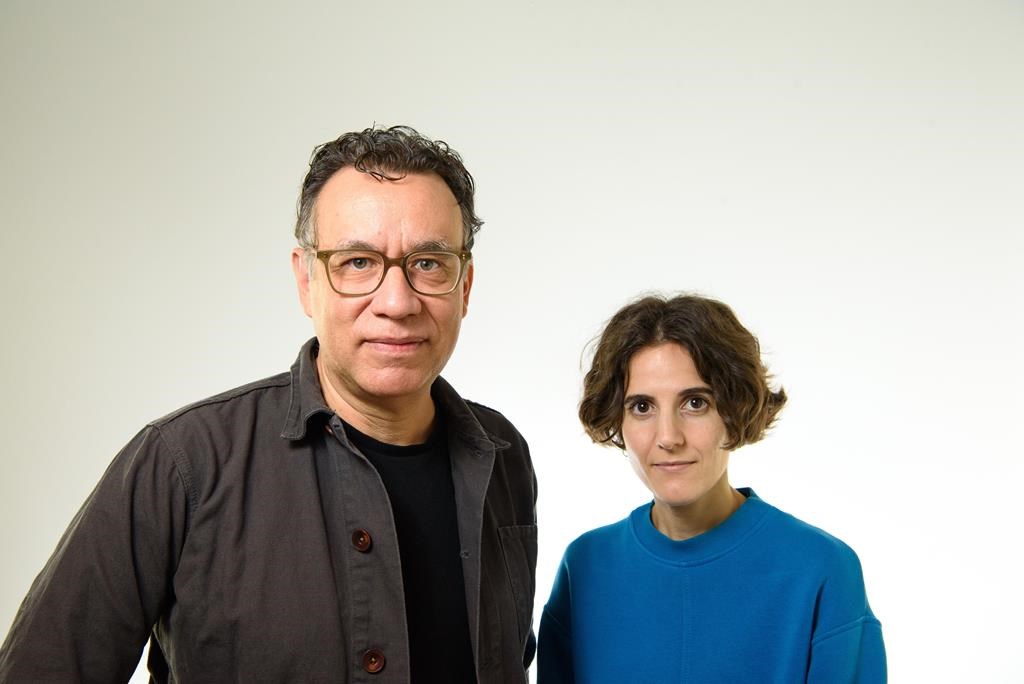TORONTO — It would seem multiple forces have conspired against HBO’s Spanish-language comedy “Los Espookys” in reaching Canadian audiences – none of them particularly magical.
To begin with, the show’s peculiar mélange of the absurd, surreal and enchanted is not easy to explain to the uninitiated, even by co-star and co-creator Ana Fabrega who likens it to a “reverse Scooby-Doo,” in which a group of horror enthusiasts are hired to trick people.
All of that is rooted in the shared humour of fellow co-creators and co-stars Julio Torres and Fred Armisen, Fabrega says during the trio’s recent stop in Toronto to launch a second season on Crave and appear at Just for Laughs.
“I think for some people maybe at first they won’t quite get it. But then you warm up to it and once you get it, then you’re really in it,” says Fabrega, acknowledging a cult-like devotion among fans.
She’s aware that many Canadians may only recently be discovering the show as it started a second season earlier this month. New episodes are added Fridays.
For many, the offbeat series slipped under the radar when it joined Crave on Jan. 15, 2021, roughly a year-and-a-half after it had already premiered in the United States – an eternity for any U.S. import hoping to benefit from cross-border promotion and critical buzz.
Its second season was then delayed by the pandemic, when halfway through its early 2020 shoot in Chile, COVID-19 precautions forced a pause that lasted a staggering two years, says Fabrega.
Still, she says none of that should be apparent to anyone now getting to know the “Los Espookys” group of friends, who sell their talents for making prosthetic monsters and mimicking phantasms to locals trying to spook rivals, scare up business or simply manipulate others.
The crew is led by Bernardo Velasco as the big-hearted Renaldo with Cassandra Ciangherotti portraying pragmatic Ursula, Torres as the self-absorbed Andrés and Fabrega playing the daft Tati.
Armisen suspects the show’s quirky sensibilities make it immune to the momentum-killing potential of production and broadcast delays, because the storyline is already so divorced from current events.
“None of it’s topical. It could exist almost at any time,” Armisen notes of the show’s somewhat timeless – and even placeless – quality.
Even the gags are not gags, per se, he says later.
“It’s so abstract. None of them are ever really jokes — it’s more that the concept is what’s funny, funnier than wordplay or anything,” he says of the series, which this season wades into the stranger-than-fiction territory of beauty pageants, presidential electioneering and intrusive U.S. foreign policy.
Although the pilot was set firmly in Mexico, Fabrega says they made a conscious decision when the series was greenlit to shift events to a fictional Spanish-language country, freeing them from having to replicate any particular city.
That also addressed the various backgrounds of each actor, who bring different accents, inflections and slang to their characters, acknowledges Fabrega, whose parents are from Panama.
Armisen, of Venezuelan heritage, says the mostly Spanish-language dialogue was a big draw for him, as was the freedom to explore unfettered a world of such wild characters.
“That was, like, the main thing and then a sense of humour that is hard to define because of Julio and Ana and myself. I don’t even know what to call that kind of humour but it just made perfect sense to us,” says Armisen, also bringing a fourth season of his mockumentary show “Documentary Now!” to CBC Gem in November.
“No one was like: You need to make this kind of comedy. It just existed on its own.”
This season his character Tico suffers an identity crisis of sorts and returns to his home country where he reunites with his nephew Renaldo, who is haunted by the ghost of a pageant queen. A couch-surfing Andrés, meanwhile, struggles to find his footing without the support of his wealthy family and vain ex-boyfriend, Juan Carlos, while Ursula channels her anger over casual sexism into political action.
Fabrega’s character Tati is as kooky as ever, but this time is immersed in a life of domesticity that puts her at odds with her sister, Ursula.
“I’m always drawn to playing and writing characters that are deeply lacking self-awareness, and really sure in themselves and what they’re doing and in their logic,” says Fabrega.
“Even if the logic is flawed, you can kind of follow how they wound up there, even if it actually doesn’t make sense.”
If anything, the anomalies of the pandemic and they way it forced introspection and new world views on many people may have helped “Los Espookys” resonate with audiences, suggests Fabrega.
She agrees that it inadvertently seems to be tapping into a collective real-world bewilderment.
“When we were writing the second season, we were hoping there would be a pandemic, to sort of parallel the themes in the show with real life,” she deadpans.
“I’m just kidding.”
This report by The Canadian Press was first published Sept. 25, 2022.



